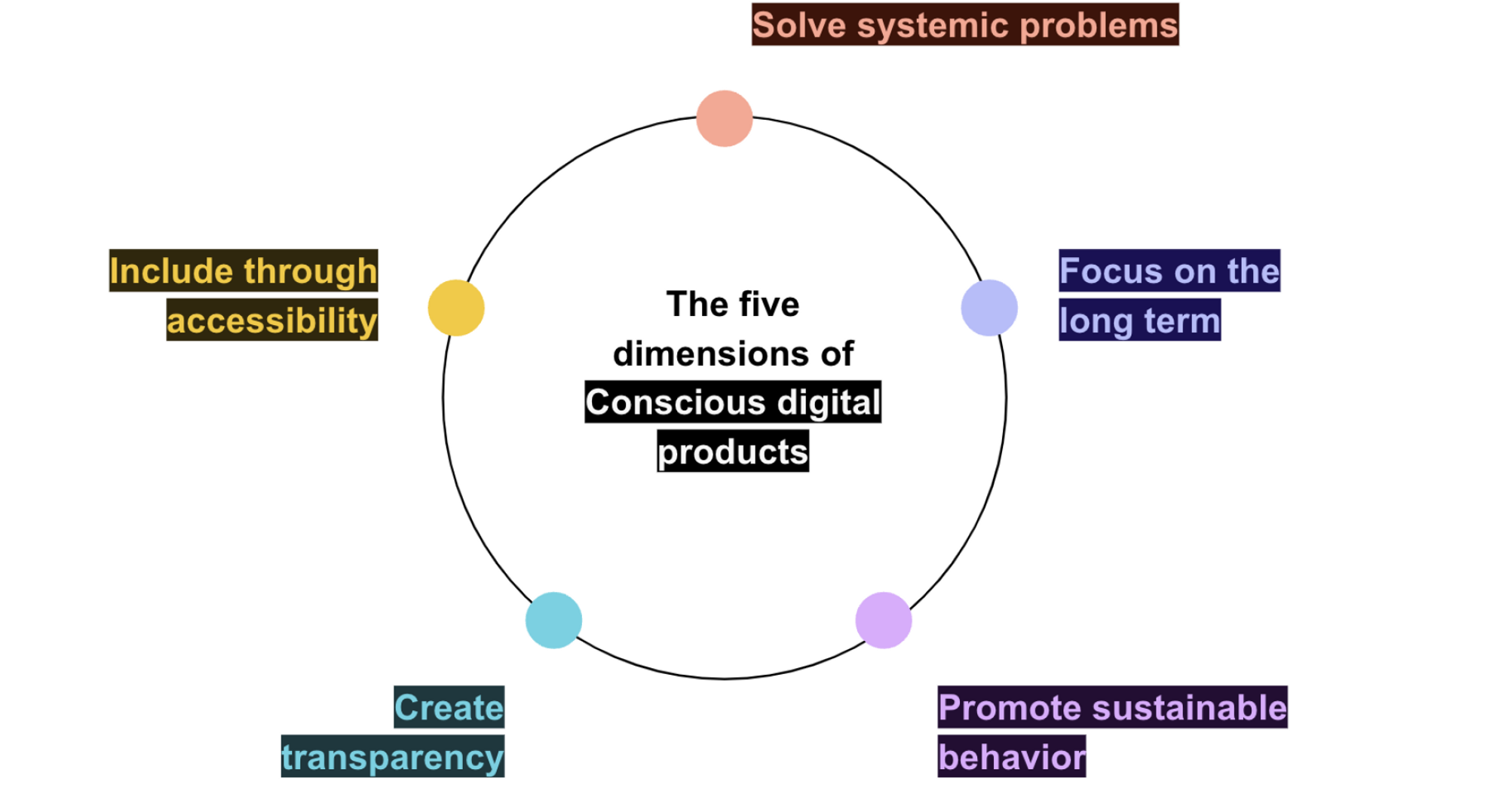The philosophy of conscious digital products
How are you today?
If you're immersed in your newsfeed, then maybe you are not so good. We seem to be facing multiple crises every day: economic and geopolitical crises, crises of health and values, and, of course, the climate crisis. We even have a buzzword for it, “polycrisis”, which is used to describe these multiple and mutually reinforcing calamities. Little wonder we often feel powerless.
But it can also be a source of motivation. We were—and are—product makers whose job it has been for 10 years to develop digital solutions for companies and organizations. Solutions that are designed to help them create and maintain market success. Have we tried to counteract the causes and effects of these crises in recent years through our work? Yes, to a certain extent. But have we done the maximum we can to generate a positive impact? Probably not, if we are honest. And given the state of the world, this means that more can and must be done!
We believe that economics and technology are two of the most powerful levers for improving human and planetary living conditions. Through our work, we can directly influence these levers to improve the situation. Our power to shape comes from our work with clients. For us, there can basically be only one brief for this: to shape and harness digital technology in the spirit of sustainable business.
Based on this, we have developed the philosophy of conscious digital products. A theory of change that moves away from extractive use of technology and exponential consumerism towards a regenerative and responsible approach. A way to help us integrate positive change through digital products into our daily work.
How do conscious digital products work?
Conscious digital products have a special character that can be identified by the following five dimensions:
Solve systematic problems
Focus on the long term
Promote sustainable behaviors
Include through accessibility
Create transparency
Problem dimension
Conscious digital products solve systemic problems. Instead of focusing on the satisfaction of individual needs, they make conscious contributions to our collective well-being. They create individual benefits by producing value for affected stakeholders and communities.
Long-term dimension
Conscious digital products have a long-term nature. Instead of prioritizing short-term goals, they create lasting value through conscious impact assessment. They create an immediate positive impact but not at the expense of the future, leaving a lasting sustainable heritage.
Behavior dimension
Conscious digital products promote sustainable behaviors. Instead of manipulating user behavior primarily in the interest of their business model, they empower users to form conscious habits. They create profitability without any exponentialism and take up only as much attention as necessary.
Accessibility dimension
Conscious digital products are maximally accessible. Instead of accepting barriers, they provide conscious inclusion for all users. They thereby expand target groups, increase product impact, and are easier and more joyful to use.
Transparency dimension
Conscious digital products are transparent and create transparency. Instead of understanding information as pure competitive advantage, they are oriented towards business networks and support conscious cognition for their purpose by others. Thus they create valuable interfaces that increase their value.

We use these characteristics as a guideline for the development of digital solutions with our customers. It doesn't matter whether all or only some of these dimensions are reflected in a product: every step in the right direction counts; every company can make a contribution; and every development in the direction of a conscious digital product is better than doing nothing and/or just thinking about it. Change always comes about in small steps, after all. But it is also clear that, in the future, we no longer want to develop digital solutions that do not try to meet the demands of conscious digital products. There is simply no time for that anymore.
What are the prerequisites for developing conscious digital products?
In the development of digital products, our industry learned long ago to move forward in incremental steps at high speed with a focus on continuous iteration. Agility is just one of the buzzwords here.
However, in order to develop conscious digital products, other prerequisites are needed, which we call DPM factors. We believe that conscious digital products can succeed when three things work together:
(D) They must be developed by diverse teams: Multi-stakeholder perspectives and contributions from diverse backgrounds make intentional and relevant digital products possible in the first place, and also get them to market faster.
(P) They must default to pragmatic solutions: conscious digital products build empathetically on a company's as-is situation and follow a realistic, measurable vision.
(M) They must have meaningful intent: conscious digital products build on authentic and meaningful intentionality that distinguishes the people behind the product and thereby shapes every stage of the development process.

With the philosophy of conscious digital products, we want to raise our own work to a new level and provide it with a new standard. It marks a new beginning for us, although in many respects it also closes a circle. Many years ago, we began our work with customers under the influence of the Lean Startup Methodology, whose well-known motto is: avoid waste. Although the focus of this method is more on process-related efficiency gains than on the programmatic design mandate that shapes the philosophy of conscious digital products, they are nevertheless closely linked.
We are not, of course, inventing a completely new wheel here. We are not alone in our intent and purpose: The Conscious Capitalism movement launched by Whole Foods founder John Mackey, for example, advocates for companies to act ethically and also in the interest of society and the environment. The Center for Humane Technology, founded by former Google employee Tristan Harris, is a powerful voice for developing the digital infrastructure of our daily lives with mental health, democracy, and collective well-being in mind.
Nevertheless, we believe that the philosophy of conscious digital products should have a place in the world. Because for people like us—digital consultants, designers, developers, and product owners—it's less about theoretical discussions and big debates. Every day, we grapple with a multitude of small decisions that, taken together, shape the products we work on, and eventually, even when just in the smallest ways, the world. With the philosophy of conscious digital products, we are describing in concrete terms what these decisions must contribute to from now on. In this way, we manifest the practical demands for our own work with customers who want to also increase their positive impact on the world. And at least as important: we invite all product makers in the world to draw inspiration for their own work.
Because we are many!